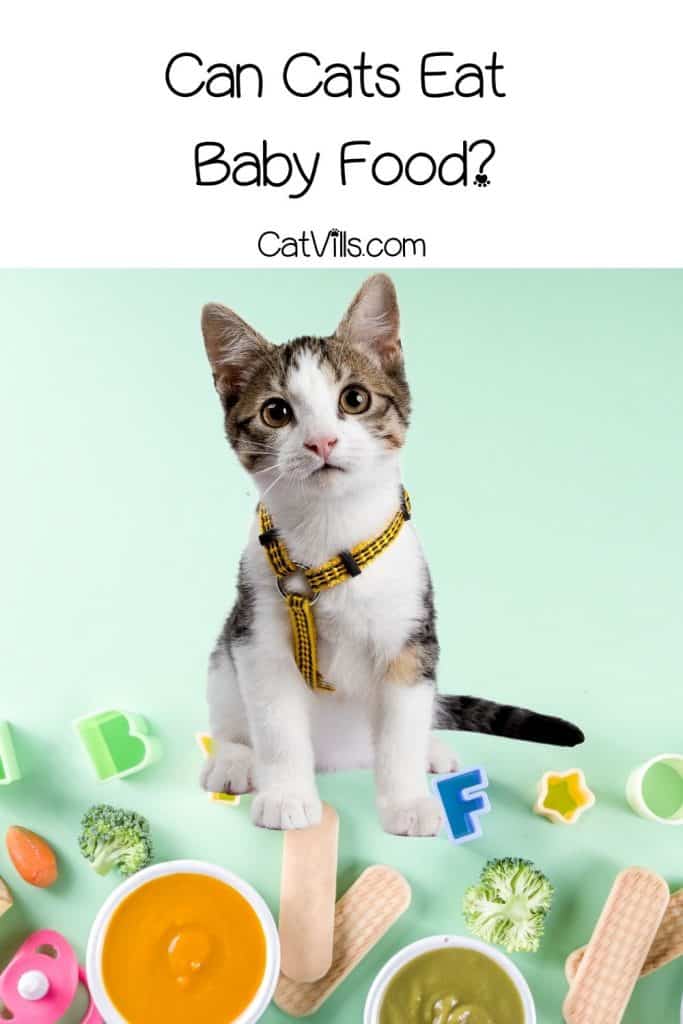Last Updated: 1 year ago
If you have run out of cat food but have a closet stocked with your infant’s favorite meals, you may be wondering, Can your cats eat baby food?
On the other hand, you may have an elderly or sick cat that turns its nose up at regular cat food and find yourself desperate to get her to eat.
But should your sick cat be allowed a bit of human food, or can your senior cat eat baby food?
Read on to find out!
Can Cats Eat Baby Food?
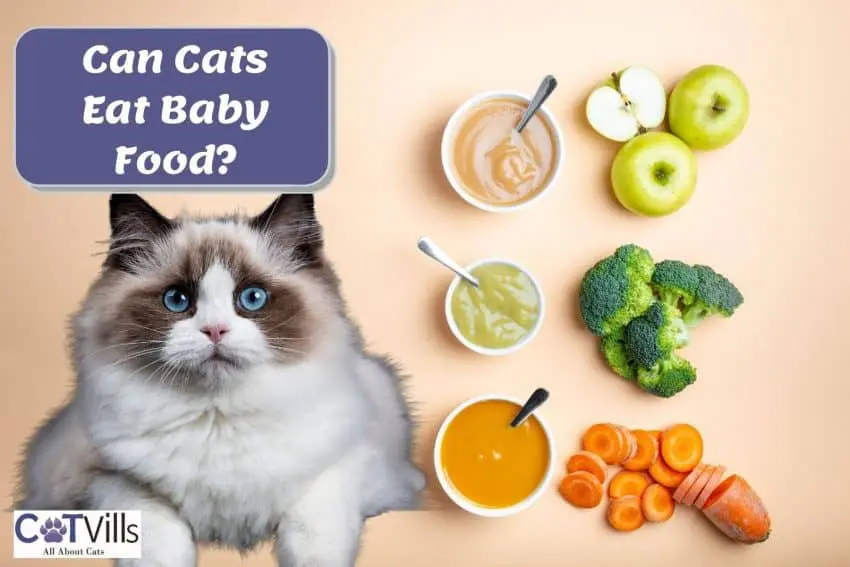
Yes, cats can eat meat-based or plain meat baby food, so long as you read the ingredients list on the label and ensure it contains nothing toxic for cats.
In general, the occasional spoonful of plain meat baby food for your cat as a treat should be fine.
However, about 60% of cats in the US are overweight or obese, a condition that causes various severe health problems as your feline ages.
So pet parents need to be careful about feeding their cats baby food in larger quantities.
According to Cailin Heinze, VDM, and DACVN, pets should receive no more than 10% of their daily calorie intake from treats.
But since some simple meat-based baby food looks similar to the pâté-style foods we find in the cat food aisle, we may be tempted to feed our cat a jar or two in a pinch.
We may also be thrilled to discover that they love it, and some picky eaters have been known to turn up their noses at anything else.
However, this does not mean that you should allow your cat to eat baby food instead of FDA-approved cat food forever.
Commercial pet food is fortified with AAFCO-approved essential amino acids, fatty acids, vitamins, and minerals.
This nutrient profile is needed to create complete cat food that meets their basic nutritional requirements.
This is quite important since cats have particular needs for certain levels of amino acids such as thiamine and taurine, and too little of these can prove fatal.
In fact, in the 1970s, thousands of cat deaths and blindnesses were traced back to a lack of taurine in cat food.
It is unlikely that baby food will have the correct levels of taurine or other necessary nutrients. Therefore, it should not be fed for a prolonged period.
However, baby food is still among the gentlest foods made for delicate baby stomachs.
So, there are several instances where you may want to use it to nurse your kitty through a rough patch:
- If your cat has a sore tooth or mouth and is struggling to eat,
- Cats who are ill, such as those with liver disease or cancer, and have a reduced appetite
- Cats who have tummy troubles like vomiting and diarrhea.
- Senior cats need to be enticed to eat by having some added to their food bowls.
In these cases, baby food is great because it requires minimal chewing. It can be handfed, and when it is heated to room temperature, it can be an effective appetite stimulant.
It also has a high moisture content that can help digestion, as this is closer to the high moisture content cats would naturally find in the raw food they eat in the wild.
Unlike raw food, however, the jars are hermetically sealed.
So, you don’t need to worry about a high bacteria content that could further upset a cat with a sensitive stomach’s digestive tract.
All of this is an excellent way to get food into your cat until they get their strength back and can eat their regular food again.
Is Baby Food Safe for Cats?
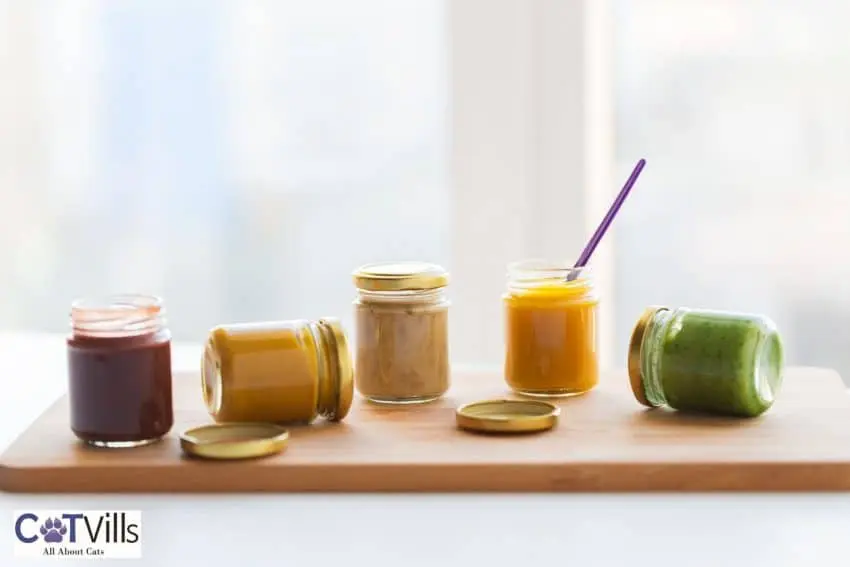
Yes, plain meat-based baby foods with no additives, seasonings, or toxic ingredients are mostly safe for cats.
However, a recent study found dangerously high levels of heavy metals such as arsenic, mercury, or cadmium in one in four tested baby foods.
This can build up in your cat’s body over time, so a long-term baby food diet is necessary.
For this reason, it’s also best to avoid foods that contain rice, sweet potatoes, carrots, or any type of fruit juice, as these have the highest levels of toxic chemicals.
Nevertheless, so long as you are only feeding the baby food for a limited time and it is basically puréed meat, it is a good option in a pinch.
But it should be made with ingredients that do not contain any fruit or substances that are toxic or very unhealthy to cats, such as:
- rhubarb,
- raisins,
- dairy products (lactose-intolerant)
- garlic or garlic powder (and other alliums such as onions, chives, or leeks)
- xylitol,
- or chocolate.
Remember, even certain vegetable mixes are too high in fiber and cause your cat an upset stomach.
After all, cats are obligate carnivores, and so they are not designed to eat substantial amounts of plant matter.
Ensure that you read the label thoroughly, though. For instance, Gerber’s 2nd Beef and Beef Broth Jar also contains lemon juice, which may be a little too acidic for your cat’s tummy.
Cats can also eat beef baby food since it is species-appropriate, meat-based baby food. Turkey and chicken baby food are usually acceptable too.
Just be careful to read the label and don’t assume that because it says beef, it is entirely safe. It may contain extra additives, colorants, or preservatives that could be bad for your kitty.
The same goes if your cat is sick. As long as baby food is made from the correct ingredients, such as a meat product,
It can be gentle on sensitive stomachs, and when warmed up, it can smell better than normal dry food and entice them to eat to keep their strength up.
The soft texture is also great for cats with dental issues who find it painful to chew or for cats who are simply too weak to feed themselves and need to be handed.
How Much Baby Food Can Cats Eat?
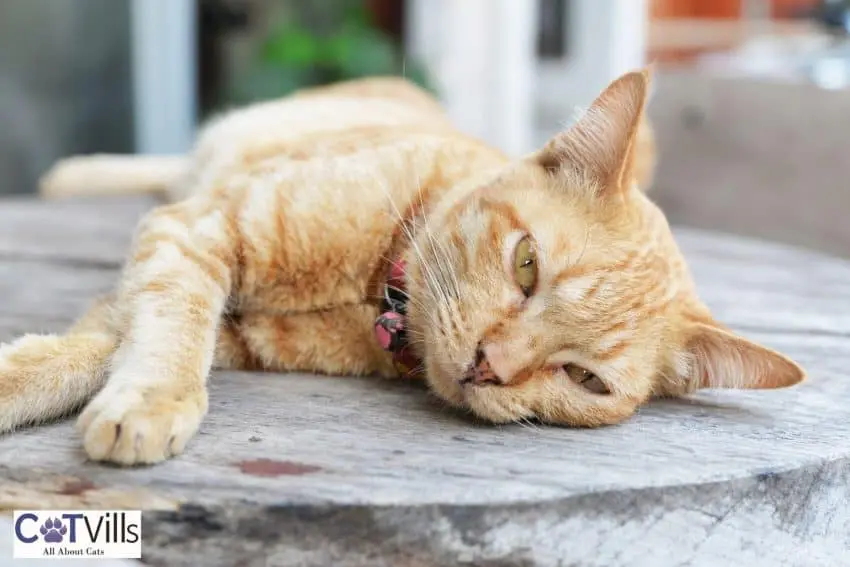
If you are feeding your cat baby food as a treat because it is something they enjoy, then a whole plate of food is obviously not the way to go.
A spoonful here or there on top of their regular food is fine, provided it is within their daily calorie limit.
If you are a new mom and find you have run out of cat food one evening, but you have a cupboard full of Gerber 2nd Chicken and Chicken Broth, then go ahead and replace the meal with what you have.
One or two meals replaced with safe, meaty baby food are unlikely to do your kitty any harm. Just don’t make it a habit.
For sick cats with appetite loss or senior cats who seem to struggle with their usual food, hand-feeding baby food that has been gently heated to around 100°F might encourage them to eat.
In this case, you can feed them as much as they are willing to take, but do not force the issue. Always feed a cat with trouble eating in a quiet but familiar part of the home.
You can try using a feline hormone diffuser to soothe them and signal that everything is “okay.”
Try putting a touch of baby food on your finger and touching it to their lips to see if they will lick it off.
If this doesn’t work, you can put a little baby food in a syringe and gently try dribbling it into their mouth. Again, do not force them to eat.
Force-feeding cats at home is stressful for both of you and can result in injury.
Instead, you can try mixing baby food with anything else you think may entice them, such as cooked eggs, tuna flakes, or chicken broth.
If your cat still refuses to eat, do not wait too long to see the vet. The problem may be more serious than you realize, and your vet may prescribe an appetite stimulant to help them along.
In severe cases, your cat may need a feeding tube—called esophagostomy tubes—to provide them with the nutrients and electrolytes they need. This should be left to professionals.
What is the best baby food for a cat?
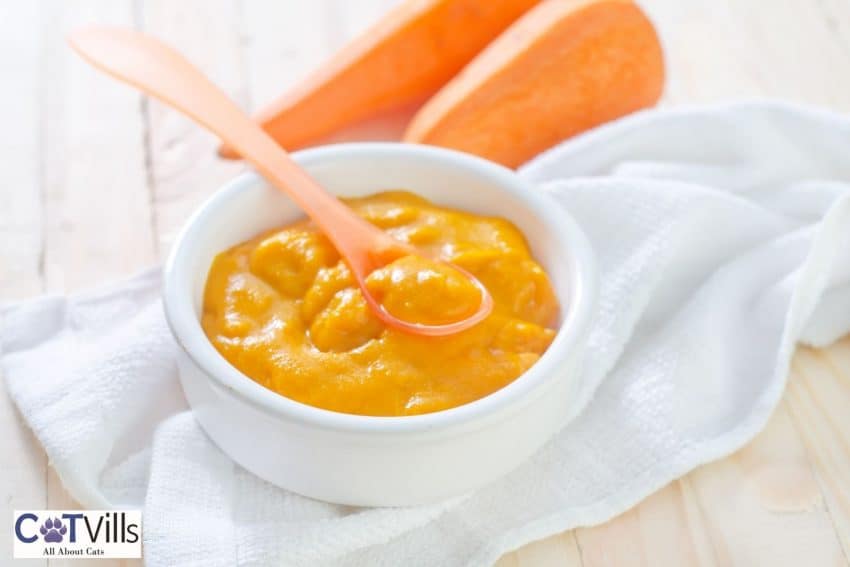
There are types of baby food that are a good option for sick or elderly kitties who need soft food to get them through a rough patch.
Some products from recognized baby food brands that we recommend—in moderation and for limited periods—are:
- Earth’s Best Organic Turkey and Turkey Broth Jar (created using only organic ground turkey and turkey broth)
- Gerber 2nd Foods Chicken & Gravy (made with ground chicken, water, and cornstarch)
- Beech-Nut Beef and Beef Broth Jar stage 1 (made with beef and beef broth; no added flavorings, onions, or garlic)
- Beech-Nut Chicken + Chicken Broth Jar stage 1 (made with chicken and chicken broth; no added flavorings, onions, or garlic)
Alternatives to Baby Food for Cats
If your cat turns their nose up at baby food, or if you are worried about heavy metals or an incomplete amino acid profile, there are plenty of alternatives.
It may just take some trial and error to find a type of food that works
1. Prescription Food
If your cat is ill with something chronic, such as liver or kidney disease, or if they have constant digestive problems, your vet may recommend a therapeutic or prescription food for your kitty.
While many owners report sterling results, keep in mind that these diets aren’t always that different from everyday cat foods and are quite pricy.
In fact, there is currently a class-action lawsuit concerning whether prescription diets such as those for cats with kidney disease should really be marketed as different from other wet cat foods with similar ingredients.
2. Homemade Soup
Suppose your cat simply doesn’t want to eat their regular dry food or has a poor appetite due to something non-life-threatening, such as stress.
In that case, you can try enticing them with some tuna flakes or a little boiled chicken mixed in their food.
If they have trouble chewing or swallowing, creating your own pureed food with boiled chicken and a low-sodium broth can be an excellent choice for cats.
Just be careful of the vegetable oil or brine in tuna, as this can be high in sodium and fats.
3. Kitten Food
If your cat is having trouble eating, a few doses of specially formulated kitten milk can be a great choice.
It is generally fortified with vitamins and minerals and is among the gentlest foods for the sensitive tummy.
It can also be liquidized with solids if you need food with a soft texture.
Another plus is that kitten milk does not contain the lactose in normal milk, which cats can’t properly digest.
You can also try wet kitten food, but keep in mind that neither formulated kitten milk nor kitten food of any type is ideally formulated for adult cats.
So it should be fed in moderation for limited periods.
Final Thoughts
In general, plain meat baby food is a simple and easy way to get an elderly or ailing cat to eat.
Although baby food is not nutritionally balanced for felines, and feeding it as a primary meal for a prolonged period of time can cause severe deficiencies, the right recipe is usually gentle on delicate stomachs.
The soft texture is also ideal for painful mouths and throats. So feeding baby food until your kitty gets stronger might be an effective appetite stimulant.
However, baby food is not a long-term option and should only be provided until your cat is strong enough to eat a more balanced diet.
